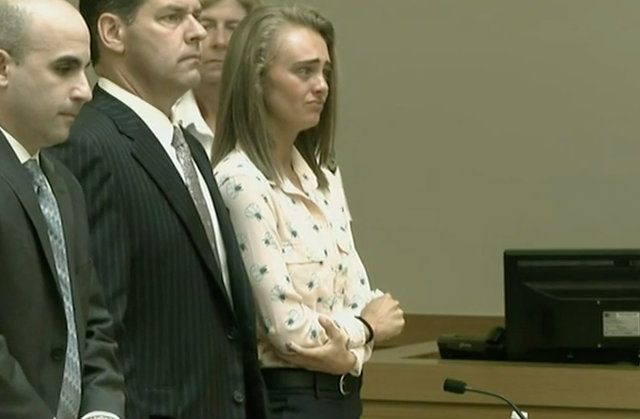
A judge yesterday handed Michelle Carter a sentence of to two and a half years, with 15 months to be served behind bars and the rest to be served on probation. Carter, now 20, was a teenager when she pressured her boyfriend into committing suicide.
The case drew international attention due to the shocking text messages Carter sent to her boyfriend, Conrad Roy III.
The judge’s sentence and subsequent stay drew plenty of reaction from Twitter followers who saw fit to either bash the justice system or at least complain about the conviction:
I am outraged with the sentencing of #MichelleCarter. Only two and a half years in prison with probation after. https://t.co/lP7zm7EiTy
— Kyle Morris (@RealKyleMorris) August 3, 2017
Encouraging someone who is struggling to kill themselves just to get sympathy from social media..Max that sentence out. #MichelleCarter
— Paige Christiana (@tpchristiana) August 3, 2017
I have almost no words for what #michellecarter did. She’s a monster and needs more than 2.5 years. I can’t even describe my mood right now.
— Aydone. (@WTWPOWERAYDEN) August 3, 2017
This is a grave injustice/affront to freedom of speech. This conviction needs to be reversed on appeal. WORDS DONT KILL #MichelleCarter
— Kenneth Belkin (@Kenneth_Belkin) August 3, 2017
I have explained before why the conviction stuck under Massachusetts law. My colleague Ronn Blitzer has explained the problems the case poses. He’s not necessarily wrong, but I think I’m more right than he is.
Anyway, some are throwing a fit about why there was even a conviction, including Amanda Knox.
Many of those complaining don’t have horribly invalid arguments. Thirty nine states have very clear laws on the books which prohibit people from helping other people commit suicide. (Some states have exceptions, usually with very rigorous verification requirements, for doctor-assisted end-of-life suicide, which is a totally different matter, as I explained here.)
As to aiding or encouraging regular suicide, though, eleven states, including Massachusetts, have no similar crystal clear statute. Over the course of many decades, the commonwealth has instead rolled suicide-helping into its definition of involuntary manslaughter.
Critics argue that involuntary manslaughter is too vague on its face to cleanly capture Michelle Carter’s conduct. That argument is at least colorable, though the appeals courts in Massachusetts have protected their involuntary manslaughter definitions for quite some time against challenges of vagueness.
Bottom line: If you’re ticked off about the Michelle Carter case, write a thoughtful, intelligent, personal letter to the appropriate legislators in Massachusetts. They have the power to craft a statute which could clearly define what is or isn’t permissible.
What follows is a collection of links to just a few of the many state laws strictly prohibiting anyone from assisting (or in some cases encouraging) another person’s suicide or attempted suicide. Note the Illinois standard: psychological pressure is enough.
Massachusetts might be wise to conduct a 50-state survey and then craft what could have the potential to be model language for other states to follow. That would at least honor the wishes of Conrad Roy’s relatives who voiced desires for legal clarity in this area.
Doing actual research is harder work than venting on Twitter, but it would at least be the first step in accomplishing something productive. Democracy, after all, requires participation of more than 140 characters.
==========
Arkansas – A person who “purposely causes or aids another person to commit suicide” is guilty of manslaughter.
Connecticut – Someone who “causes a suicide by force, duress or deception” is guilty of murder. Someone who “intentionally causes or aids another person, other than by force, duress or deception, to commit suicide” is guilty of manslaughter.
Florida – Deliberately assisting in someone’s self-murder (as it’s called there) is manslaughter, a second-degree felony. Interestingly, commercially exploiting self-murder is a third-degree felony.
Illinois – Inducing another to commit suicide has various penalties depending on the circumstances ranging from a Class A misdemeanor to a Class 2, 3 or 4 felony. Notably, in Illinois, coercing and controlling another person into committing suicide through “psychological pressure” alone is enough to trigger criminal conduct. (Michelle Carter would have been in a lot of trouble in Illinois.)
New Hampshire – Causing or aiding a suicide by purposefully aiding or soliciting another person to commit suicide is a Class B felony if the defendant’s conduct causes death; otherwise, it is a misdemeanor.
New York – New York has separate statutes which make it illegal to promote a suicide attempt or to “intentionally cause[] or aid[] another person to commit suicide.” The first is a Class E felony, the second is punishable as an attempt to commit murder, and the third is punishable as manslaughter, a Class C felony.
==========
Aaron Keller is an attorney and live streaming trial host for the LawNewz Network. Follow him on Twitter at @AKellerLawNewz.